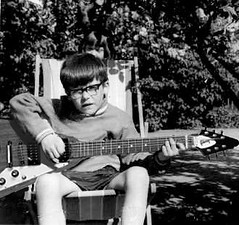Tuesday, July 29, 2008
Sisters of Mercy, 'Floodland', 1987

The Joe Man turned me on to this monster record back in 89/90. 'Lucretia My Reflection', and 'This Corrosion' are the tracks that hooked me. I'm sure I have them on some cassette mix-tape somewhere, but I need the vinyl.
Pop Will Eat Itself, 'Dos Desdos Mis Amigos', 1994

Rob Kendall, my roommate for much of 94-99, had this record. I don't know about the whole album, but the lead-off track, 'Ich Bin Ein Auslander', is total bad ass shit. I need it, hope it was released on vinyl.
Radiohead, 'The Bends', 1995

Radiohead's second effort, 'The Bends' is probably their best effort, made back when they were actually concerned about writing good songs.
Spiritualized, 'Pure Phase', 1995

Again, Rob Kendall turned me on to Spiritualized, as well as Spacemen 3, Jason Spaceman's former band. 'Pure Phase' is mindblowingly good, featuring 'Let It Flow', 'Lay Back In the Sun', and 'Medication' among other odes to opiates.
Nine Inch Nails, 'Fixed', 1992

The companion piece to the 'Broken' EP, 'Fixed' features absolutely insane remixes of tracks from 'Broken'. 'Fixed' scared the shit out of me.
Ministry, 'Psalm 69', 1992

The epitome of Industrial Metal, and Ministry's finest moment, 'Psalm 69' scared the shit out of me as well. Gibby's vocal on 'Jesus Built My Hotrod', and William Burroughs' spoken word on 'Just One Fix' help place this record at the top of the Sickest Shit Ever list.
Pigface, 'Notes from the Underground', 1994

Another Kendall discovery, Pigface is the brainchild of Martin Atkins, and features a revolving cast of characters including Al Jourgensen, Genesis P. Orridge, and Jello Biafra among other total nutjobs. 'Chikasaw', featuring Lesley Rankine (Ruby), just blows me away.
Saturday, July 26, 2008
5) Kiss - 'Won't Get Fooled Again', Mid Hudson Civic Center, 1984
4) The Replacements - 'Happy Birthday' (to Keith), Meadowlands, 1989
3) Microdot - 'Left of the Dial', Tedstock, 2005
2) Georgia Satellites - 'I Wanna Be Sedated', The Chance, 1988
1) Marillion - 'Tonight I'm Gonna Rock You, Tonight', The Ritz, 1987
Friday, July 25, 2008
Ian Astbury formed Southern Death Cult in the Post-Punk climate of Britain, 1981, and along with Bauhaus and Sisters of Mercy (among others), helped define what has become known as Goth.
Southern Death Cult lasted a cozy year and a half before disbanding. Then Ian met guitarist Billy Duffy, and formed Death Cult.

After releasing a self titled EP in 1983, the band dropped the 'death' in an effort to garner a broader appeal.
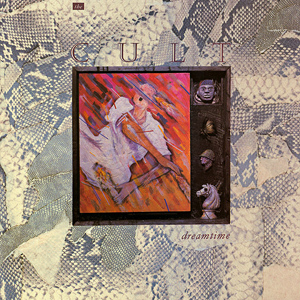
A year later the band emerged from Rockfield Studios in Wales with the 'Dreamtime' record. Duffy's highly processed guitars and Astbury's developing powerhouse vocal style carry the record which suffers from less than great production. The frequent lyrical references to American Indian culture on 'Dreamtime' coupled with the resonant tenor quality of Astbury's voice inevitably conjure up a Jim Morrison vibe that he has done little to distance himself from, and much to exploit.

In 1985 a much more well defined and focused LP, 'Love', was released, containing the band's breakthrough single, 'She Sells Sanctuary'. Not entirely devoid of their Post-Punk roots, on 'Love' The Cult favor a more Psychedelic sound courtesy of Billy Duffy's penchant for signal processing, and the much improved production provided by Steve Brown.
To date, The Cult had developed their sound steadily and a clear direction, each ensuing release a more mature, more evolved take on the same sonic idea, that of layers, effects, and lots of whooshy-whoosy. In 1986 they took a fork in the road, a fork that lead to a complete overhaul of their sound.
Initially The Cult began work on their next album with Steve Brown, but after tracking had wrapped, they weren't happy with the sound. They asked the then up and coming producer Rick Rubin to remix the record. Rubin, who at that point had produced three records: LL Cool J's 'Radio', the Beastie Boys 'Licence To Ill', and Slayer's masterwork 'Reign In Blood', demanded that they re-record the album with him at the helm.
The first thing Rick Rubin did was to take away all of Billy Duffy's effects pedals. He stripped the band's sound down to highlight the great Duffy riffs that were buried in the heavy application of whooshy-whoosh.

The result was 'Electric', a decidedly Hard Rock record wherein The Cult completely abandoned the Post-Punk and Psychedelia, and totally embraced the Big Guitar sound of, well, AC/DC basically. Rick Rubin made a Mutt Lang Hard Rock record while Mutt was busy making Pop stars out of the formerly Hard Rock band Def Leppard.
'Electric' was refreshing in it's blatant derivative-ness. The Cult gave us the Hard Rock that the Hard Rock bands had stopped giving us, and they found a very receptive audience for it. That was fortunate for the band, as the new direction was a veritable slap in the face to the Goths and Punks who had supported them up to that point.
With the success of the single 'Love Removal Machine', and the support of MTV, 'Electric' established The Cult in America. A world tour followed, and the band gained a Zepplinesque reputation for tour behaviour.

Producer Bob Rock was brought in for 1989's 'Sonic Temple', and Bob let Billy have some of his toys back, though the lesson was learned, and the focus on Big Riffs remained. 'Sonic Temple' launched four singles, including 'Fire Woman', and 'Edie (Ciao Baby)', and launched The Cult to the top of the Rock heap - a difficult place to keep a foothold.
The lack-lustre 'Ceremony' followed. Astbury and Duffy were at odds. The magic was gone, and the ensuing records consistently failed to measure up. By the mid 90's the band was on hiatus, and Astbury engaged in some side projects. A brief reunion, complete with sub-standard album, came and went, and then Astbury left to join the Doors.
The Cult has recently reformed again. I'm not sure I care.
I picked up a couple more slabs o' vinyl the other day.
'This Is the Moody Blues'

I've never been too keen to invest in a Moody Blues record. My feelings about the Moody Blues are luke warm at best. There are a couple of songs I like, so when I saw this greatest hits package from 1974 for 2 bucks, I figured what the hell, right? Well, when I more closely inspected the record at home I discovered that it was a two record set issued in one sleeve (I hate when they do that), and only one of the discs was inside. The song I like the most, 'Questions', was on the disc I did get, as well 'Legend of a Mind'. I did not get 'I'm Just a Singer (In a Rock and Roll Band)' or 'Nights In White Satin'. I think I'll survive.
I listened to both sides, and I'm even more convinced that there's no reason to dig deeper into The Moody Blues. Why is The Moody Blues often referred to as Progressive Rock? I'd lump them in wherever you put Procul Harum and Jethro Tull.
'Radio K.A.O.S.'

My first solo Waters record. I've heard much of his solo stuff through Chrispy. I like this one better than 'The Pros and Cons of Hitchhiking', which sounds to me like Roger had Clapton come in for one day to toss off leads willy nilly all over the record in an effort to display his lack of need for Gilmour. 'Radio K.A.O.S.' seems a bit more focused.
Tuesday, July 22, 2008

Skorpionalben der Oberseite 10:
1) Lovedrive
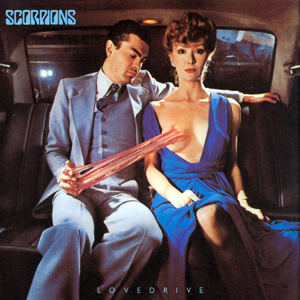
Certainly sporting the greatest album cover of all time, 1979's 'Lovedrive' is a tour de force. Top to bottom, front to back, not a weak track on it.
In 1978 guitarist Ulrich Roth left the band amicably to pursue his hendrixian style unhampered by Klaus and Rudy's heavier, more accessible, and less cluttered brand of ass kicking Rock. They were still pals, and Uli even provided them with a replacement in the form of young protege Matthias Jabs.
Work began on 'Lovedrive' at producer Dieter Dierks' studio in Koln (Cologne) with Jabs providing competent and commendable contributions, but the stakes were high. The Scorpions were on the cusp of breaking in America, and competent and commendable wasn't enough; the Scorpions needed great. Matthias was put on waivers. He had the gig, but they wanted him to sit out the proceedings for a bit and keep developing his guitar skills. They could afford to do so because around the same time Rudy's brother Michael had just left UFO and was available to join his old band in the studio. In the end Michael played lead on three songs (including 'Another Piece of Meat'), Matthias appears on three, and Rudy handled the rest himself ('Holiday', 'Coast to Coast', 'Always Somewhere').
The Scorpions were a hard rock band in the process (along with contemporaries Judas Priest) of inventing modern Heavy Metal, and the rockers on the record prove their exemplary ability to kick ass, but it's the slower ballads and less intense numbers on the record that have kept me coming back to it for almost thirty years.
'Holiday' is undeniable, a truly great song, stunningly beautiful layered acoustic guitar picking balanced by a monster Big Rock coda. 'Holiday' is also one of Klaus' shining moments, displaying his great range and power.
'Always Somewhere' is the kind of track that sneaks up on you, digs in, and doesn't let go. So many Hard Rock/Heavy Metal lyrics of that era tend to explore life on the road, most likely because that's where the majority were written, but 'Always Somewhere' manages to avoid the trite and cliche, and deliver an evocative performance.
'Coast to Coast' is an instrumental with a rare groove for a Metal tune, and it remains a staple in the Scorpions live set to this day. 'Coast to Coast' is simply a great and fun tune.
'Can't Get Enough', 'Lovedrive', and 'Another Piece of Meat' provide the muscle, the sheer rocking that the Scorpions do so well, and 'Loving You Sunday Morning' blazes the Heavy Pop trail that Def Leppard would later exploit.
'Is There Anybody There' is a most unusual track, and maybe my favorite. What prompted this band of Teutonic Metal Gods to explore the uncharacteristic territory of Reggae is a mystery, and while there's no question that they're a bit out of their depth in doing so, they manage to deliver a pleasing departure from the format. I do not suggest putting 'Is There Anybody There' up against 'Three Little Birds'; there's no comparison, but the attempt in itself is laudable.
2) In Trance

Jackson has already reviewed this record here, but in summary for those less inclined to click away from my captivating prose, 'In Trance' is Ulrich Roth's finest hour, and also displays some of Klaus' more amazing performances.
In 1975 the Scorpions were still laying the groundwork for their later international success, and on this, their third album, the band delivers their first truly solid work. The only problem with 'In Trance', a factor on all Ulrich Roth Scorpions records, is the questionable decision to let Uli sing a couple of tunes. Uli's voice takes a bit of getting used to, and even then it can be a deterrent, on top of which there's the perplexing nature of Uli's lyrical style. Roth is an apparent fan of psychedelic laden imagery in the vein of Cream or early Hendrix, which is bad enough without the language barrier. One can picture Uli with a German to English thesaurus jotting down his notions of psychedelia.
"Summerday is gone, listen to the evening wind
Singing tunes of tamarind into the setting sun
You lie in twilight sleep dreaming colours deep
Today all life is gone"
Klaus wasn't exactly a master of the English language either, but he wasn't trying to write in an established style like Uli, and his songs turned out more accessible; some even resulting in excellence like the title track, and the splendid 'Life's Like a River'
3) Virgin Killer
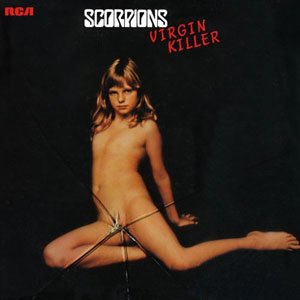
'Pictured Life', and 'Catch Your Train' are astounding, and Eddie Van Halen admits to the influence they had on his playing. 'Backstage Queen' showcases the decidedly more accessible direction that Klaus and Rudy were moving toward. 'Crying Days' and 'Yellow Raven' are pleasing down tempo, almost ethereal numbers, and Uli chimes in with three lead vocal numbers: 'Virgin Killer', 'Hell Cat', and 'Polar Nights'. The first two are manic, frightening numbers showcasing remarkable guitar skills and stupid regrettable lyrics. 'Polar Nights' finds Uli competing with Robin Trower for the Hendrix heir apparent crown, and would be a better song had he let Klaus sing it.
4) Taken By Force

This hard to find LP from 1977 was the follow up to 'Virgin Killer', and Ulrich Roth's swan song with the band. 'Steamrock Fever', 'We'll Burn the Sky', and 'He's a Woman - She's a Man' are featured on the much more well known live album 'Tokyo Tapes' recorded during the tour in support of 'Taken By Force', and 'The Sails of Charon' has benefited from it's inclusion on their first greatest hits package, 'The Best of the Scorpions'. If, then, you're thinking that you don't need this record, you are mistaken, because you need 'Riot of Your Time', and, if you buy the CD re-release you get the previously unreleased studio cut of 'Suspender Love', another killer 'Tokyo Tapes' track.
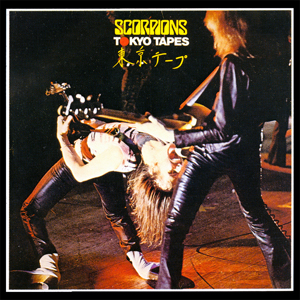
5) Blackout

Their breakout LP from 1982, 'Blackout' established the Scorpions in America with the hit 'No One Like You', a commendable commercial effort that stands up to the test of time. The title track continues the thematic formula of a narrative about sexual encounters gone wrong set to a massive riff.
What saves the LP, along with the hit song, and the solid Rocking displayed throughout, are the last two cuts, 'China White', and 'When the Smoke Is Going Down'. 'China White' is a super heavy down tempo number based on the 'less is more' ethos, and 'When the Smoke Is Going Down' is another beautiful ballad in a long line of such offerings.
6) Animal Magnetism

The title track is worth the price of purchase, simply wicked, it's Matthias' finest moment. Also included on the LP is 'The Zoo', which most people thought of as Matthias' finest moment until they read this post and were corrected in their thinking, which is not to suggest that 'The Zoo' is anything less than uber super duper. Who doesn't love Talk-Box?
'Hold Me Tight', 'Twentieth Century Man', 'Falling In Love', and 'Don't Make No Promises (Your Body Can't Keep) are notable tracks in the grand Scorpions Rocking tradition, the latter being the second installment of the sexual encounter gone bad series, and 'Lady Starlight' admirably fills the mandatory ballad spot on the record.
7) Love At First Sting

This is where I draw the line with the Scorps. The album is mostly formulaic drivel, 'Big City Nights' being a prime example of style over substance, a stratagem that dominates this gazillion selling package of eight turds and one gem.
8) Fly to the Rainbow

The Scorpions sophomore effort from 1974 is also Ulrich Roth's debut. In '74 Uli's freaky acid infused style was still fairly relevant, and his sole composition, and vocal, is the truly wonderful 'Drifting Sun'. 'Speedy's Coming' was the single, and it's a fun little number that references the Rock scene in '74, name checking Ringo, Bowie, and Alice Cooper. Jackson quite likes the title track, and finds the whole album enjoyable, but he also knows you prefer to be rocked like a hurricane. If there was one song as good as 'Still Loving You' on 'Fly to the Rainbow' this record would give 'Animal Magnetism' a run for it's money.
9) Lonesome Crow

10) Humanity: Hour 1

The most recent Scorpions offering (2007), 'Humanity: Hour 1' contains at least two great tracks: 'Humanity', and, you guessed it, 'Hour 1'. I don't own the record, but based on the performances of those songs at their recent visit to the Beacon Theater in NYC I'd have to place 'Humanity: Hour 1' above 'Savage Amusement', which has no good songs, and 'Crazy World', which contains the mediocre but timely composition and massive hit 'Winds of Change', and, I'm convinced without hearing any of it, nothing else of any worth.
Besides it's a Skorpionalben der Oberseite 10 list, so 10 it must be.
Monday, July 21, 2008

First some background. In the mid 60's a social sub-culture developed in the Haight Ashbury neighborhood of San Francisco. That scene died in the fall of 1967, but the bands that came out of that scene kept hippie culture alive. The pre-eminent band of that bunch was the Grateful Dead, and throughout the 70's, 80's, and early 90's a self contained society developed around the band, traveling to show after show. It had it's own economy based on the sale/barter of trinkets (hand crafted jewelery and pipes) and drugs.
In 1995 Jerry Garcia died, and with him, the Grateful Dead, but waiting in the wings to take the baton was Phish, a less blues based and more technically proficient band from Vermont. Phish inherited the fan base, the nomadic subculture, and built on it. Phish began putting on festivals that they not only headlined, but produced. They controlled everything.
Phish was a horrible band, and they eventually packed it in.
Now the Disco Biscuits, among other acts, are attempting to keep the Hippies alive.
Camp Bisco was a Disco Biscuits event.
I don't like them either, but tons of Hippies do.
Figo are not Hippies. We tried to wake them up a bit. We had fun. Figo played one of their best performances. The Hippies were afraid. Afraid of the Rocking. Silly Hippies.
Hippies have really dirty feet.
Wednesday, July 16, 2008

Tuesday, July 15, 2008

Much like the Stones, my brother Rod had exposed me to David Bowie long before I actually took much interest, and whereas Tony Alva was the impetus for my long overdue appreciation for the Stones, it was Milkyum who sat me down with 'The Rise and Fall of Ziggy Stardust and the Spiders From Mars' in 1984.
Although I accepted Ziggy, both the record and the man, as a work of genius, it sort of stopped there for a goodly amount of time.
Again, it was Milkyum who jolted me out of that rut in 1989 when he brought home the 'Sound and Vision' package. Much like everyone else, I was familiar with Bowie's initial and seemingly ubiquitous greatest hits package, 'ChangesOneBowie'. What I wasn't familiar with was anything else except 'Ziggy' and 'ChangesOneBowie'. 'Sound and Vision' fixed that. It was probably 'Panic In Detroit' that made me sit up and pay attention.
Still, however, I managed to remain only casually interested in Bowie. Having seen his 'Glass Spider' tour in '88, and having been extremely disappointed, I needed more convincing.
In '92 I set off to Albany for two years to finally put the last few nails in my undergraduate studies. In setting up my household I needed a CD player, so I went to Montgomery Ward to pick one up, and while I was there I spotted yet another Bowie compilation, the two disc set, 'The Singles Collection'.
That did it.
I was blown away by 'Life on Mars', 'Oh, You Pretty Things', 'Sorrow', and even acquired a fondness for post-Ziggy Bowie, which had always been the stumbling block for me. 'Be My Wife', 'Boys Keep Swinging', and 'Look Back In Anger' cured me of my issues, and paved the way for a classic Jackson style catalog acquisition. I bought all the Bowie I could find, but wisely stopping at 'Let's Dance'. There are certain absolutes in life, and Bowie between '83 and '93 is almost completely devoid of worth. 'Absolute Beginners' and some of the Tin Machine stuff are notable exceptions.
At any rate, I became a full fledged, card carrying Bowie freak.
In '96 I saw him live again, he played Roseland, and it was just after his co-headline tour with Nine Inch Nails. His band was shit hot, and although the techno/industrial vibe of his recent record, and the tour with NIN, was still prevalent, he played to please. He played songs that we wanted to hear. Still no 'Ziggy', but 'Moonage Daydream' was a very acceptable substitution. Oh yeah, the band, did I mention that they were shit hot? The reinstatement of piano player Mike Garson was a welcome comfort factor amid all the synthesizers and sequencers, but what really blew me away was his bass player, Gail Ann Dorsey, a tiny monster of a bass player, black, bald and barefoot, who took on the Freddy Mercury vocal parts for 'Under Pressure' and delivered the goods with considerable ability. Bowie's Tin Machine band-mate Reeves Gabrels handled the lead guitar spot, and though I'm not a huge fan of his hyper-electronic style, with all the squeals and wackiness, the songs were still the songs, and they were great songs.
Having redeemed himself for the crimes committed in the 80's, Bowie returned to making good records, even reuniting with producer Tony Visconti after many years for 2000's 'Heathen'.
I saw Bowie again in 2005 at Jone's Beach. He had kept much of the band I saw in '96, replacing Gabrels with another old pal, Earl Slick, a move I very much approved of.
The Thin White Duke had truly returned, and all was well.
Jackson's Best of Bowie Albums List:
1) Ziggy
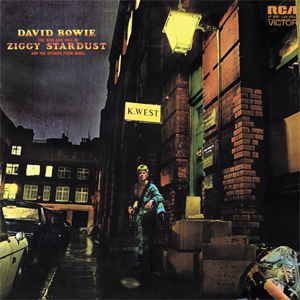
There's no argument here, again, there are certain absolutes.
2) Hunky Dory
If you listen close, you can hear Ziggy being born, it happens during the final moments of 'Life On Mars'. 'Changes' is the big tune, but I quite like 'Quicksand', 'Oh, You Pretty Things', and 'Queen Bitch'.
3) Let's Dance
With age comes clarity, and it's clear that 'Let's Dance' is nearly flawless despite it's commercial appeal. You already know the songs.
4) Aladdin Sane
Ziggy's last stand, and the last Ronson record, 'Aladdin Sane' contains my all time Bowie fave, 'Time', as well as a number of other standouts like, 'Drive In Saturday', 'Panic In Detroit', 'Cracked Actor', 'The Jean Genie', 'Watch That Man',and the title track. That's enough.
5) Diamond Dogs
On the strength of 'Sweet Thing'. It amazes me that it's David playing that sweet nasty guitar. 'Rebel Rebel' doesn't hurt it any, and the title track is a classic as well.
6) Scary Monsters
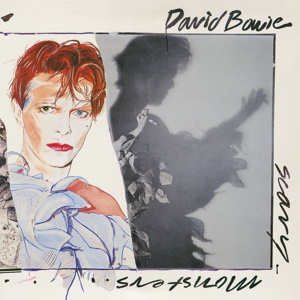
The bridge between Berlin era Bowie and the High Pop of 'Let's Dance' and after, 'Scary Monsters' finds David just where I like him, slightly weird, but accessible. Highlights include 'It's No Game', 'Up the Hill Backwards', 'Scary Monsters', and 'Ashes to Ashes'.
7) Station to Station
Many Bowie aficionados would rank 'Station to Station' much higher, but though I understand it's importance in his development, I just think that the songs aren't quite up to snuff. With the exception of 'Golden Years', and 'Wild Is the Wind', which is a cover, the other tunes are good, but not great. You won't find 'Station to Station' or 'TVC-15' in a current Bowie set list. The importance of those songs is the Kraftwerk influence, and Bowie's blend of that with R&B. The Krautrock fascination would take David, with Iggy in tow, to Berlin for his next series of influential, but decidedly un-commercial records.
8) Low/ 9) Heroes
1977's 'Low' and 'Heroes' finds David in Berlin with Brian Eno, racks of synths, and a rekindled ambition to make art. 'Low', and it's successor 'Heroes', are presented as two separate and distinct sides. Side One contains songs, Side Two consists of instrumentals. Although 'Heroes' is by far and away the best song from this period, 'Low' has a bit more to offer with 'Always Crashing In the Same Car', 'Sound and Vision', and 'Be My Wife'. Both records offer plenty of interesting soundscapes and creative production values, but in the end, David wasn't concerned with mass appeal, and it shows. That's why 'Scary Monsters' ranks higher than these oft touted influential offerings, it marries the art with accessibility. On 'Low' and 'Heroes' the audience is very much on the outside of the proceedings. David let's us in, a bit, starting with 'Lodger', the follow up to 'Heroes', even more so on 'Scary Monsters', and by 'Let's Dance' were all one big happy dancing family.
10) 'Lodger'
I had to think for a bit about this one. The other choice was 'Young Americans'. Again, most people would have probably ranked 'Young Americans' much higher, certainly above 'Lodger', but I just don't like 'Young Americans' very much. It sounds cold. It sounds like the absence of joy. 'Lodger', while no joyfest, has much more character, it has a sense of self lacking on 'Young Americans'. Sure the song 'Young Americans' is much better than anything on 'Lodger', but 'Lodger' has more depth with tracks like 'DJ', 'Look Back In Anger', and 'Boys Keep Swinging'.
Honorable Mention:
If David had combined the best bits of 'Outside' (95) and 'Earthling' (97), the result would be a formidable album that would have made the list. He didn't, and they don't.
Well, it seems there's another thing we all have to look forward to. David Bowie is releasing a live record recorded during the Ziggy Stardust (1972) tour in Santa Monica.

You can listen to it here, if you let VH1 install it's media player. I'll wait until I can hold the record in my hand and read the liner notes as I listen to what I'm sure is utter magic.
Read reviews here.
I'm quite sure this record will take the top slot on any 'Best Records of 2008' post of mine.
I'm also fairly sure it will be a cozy little list of two with this record and the Mudcrutch record.

Hmmmm, I guess House of Blondes makes three.

Hey, you never know, 'Chinese Democracy' might come out this year.
Pigs also might fly.

'Chinese Democracy', hee hee, just typing it makes me chuckle. Has any record ever had such a lengthy incubation? Has any record ever been so destined to be ant-climatic? Has any technically non-existent record ever had a wikipedia entry? I mean, even the title is so familiar now that it's become devoid of any power it might have had. If I was Axl, and I'm so very glad that I'm not, I'd come up with a new title.
It's just a joke at this point, and yes, I'm curious to hear it.

The first I ever heard of U2 was from Milkyum's then very hip uncle who mentioned them to us on a camping trip in Cape Cod in the fall of 1980. He told us that they were going to be the next big thing. We said; "Yeah, whatever, where's that Iron Maiden cassette?", and we promptly forgot all about U2.
A couple of years later, in the lunchroom at O'Neill, Milkyum, Billions, and I were commiserating about the usual stuff, chicks and music. Somebody mentioned that they had seen this band U2 on cable TV performing in concert, and it turned out that we all had tuned in. We all agreed that the band 'had something'. We all liked the captivating vocalist and his unique vocal style, how he let his voice crack impactfully, and we were puzzled and somewhat amazed by the guitar player who used echo as a rhythmic device, not just an effect.
It was clear, to me at least, that U2 demanded further investigation. I went out and bought their most recent release, 1983's 'War', and thus began an enduring love affair with this unique band of Irish upstarts.
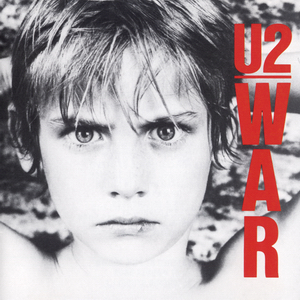
I listened to 'War' in heavy rotation during my senior year of high school, and by the time I showed up at the University of Maryland I had obtained their debut, 'Boy', and the mini LP of the concert we saw on cable, 'Under a Blood Red Sky'. At this point, U2 was just one of a number of bands that I was into, but during that first semester at the U of M two things happened that would propel U2 to the forefront of my musical attention. First I met Pat Coppinger who was a huge U2 fan, and then 'The Unforgettable Fire' came out.

'The Unforgettable Fire' remains my favorite U2 record despite the fact that it's not as strong of an album as both it's predecessor, 'War', and it's successor, 'The Joshua Tree'. The place in my heart occupied by 'The Unforgettable Fire' knows no reason, it's not constrained by any objective point of view. I know songs like 'Elvis Presley and America' and 'Indian Summer Sky' lack focus, and could be construed as unfinished, but I don't care, and I don't love them any less for it. At any rate, the stronger tunes, 'A Sort of Homecoming', 'The Unforgettable Fire', 'Pride', and 'Wire' totally take up the slack, and the little mini-songs, 'MLK', 'Promenade', and '4th of July' are sublime mood moments that, for me, make the record special.
And then there's 'Bad'. Had two chords ever delivered such majesty? Maybe, but I hadn't discovered the Velvet Underground yet. U2 had.
And the record sounded so fresh and new, and from a band that had already been fresh and new sounding. With 'The Unforgettable Fire' U2 embarked on a new direction in their approach to recording. Steve Lilliwhite, who had produced all the previous U2 records, was passed over for the production team of Brian Eno and Daniel Lanois. Eno was all about soundscapes, and Lanois was about songcraft and performance.
In addition to the change in personnel, they opted for a change of venue as well. They set up a studio in an old Irish castle, and immersed themselves in the process of making a record without the distractions of the big studio environment.
There was something to U2 beyond the radical sound, however, something that spoke to a part of me I hadn't been aware of, a social conscience. U2 woke me up to political struggle, as they did countless others not unlike myself, and they did it at a time when such a notion was all but dead in popular music.
Primed by a few months of immersion in the new record, U2 came to the Capitol Center. That show was the closest I've come to a truly religious experience. I was moved by an empathy more powerful than myself, it was a mass convergence, thousands of people beating with one heart, a singular experience that has never been repeated, not nearly.
That summer brought Live Aid, and U2 crowned themselves the greatest band in the world in fifteen minutes, the lion's share of which came in the form of one of the most impressive live performances ever. When the band began their second song, 'Bad', Bono decided to grab the brass ring, he went beyond, beyond the barriers, both the physical barriers separating the band from the crowd, and the less tangible barriers of what's expected from a band, and the ability to deliver a message. The message was hope, and everybody got it. They got it at Wembley, and they got it at home watching on television.
So, as a huge fan, I was eagerly anticipating the next record, and when 'The Joshua Tree' hit in 1986, I was greatly pleased. The problem was, as often happens, so were countless millions of others. 'The Joshua Tree' exploded, hurled U2 to the top, and rightly so, but when Rolling Stone labels you 'The Band of the Eighties', there will be repercussions.
It was evidenced in the girth and scope of 'Rattle and Hum', that the band had lost the plot, so to speak. Sure, they were still U2, they still sounded like U2, but something had changed. Was it expectation? Growth? I'm not sure, but the band I loved, the band with it's heart on it's sleeve and a distinct and unique sound had somehow gotten distilled.
U2 were Rock Stars.
Oh well, it was great while it lasted.
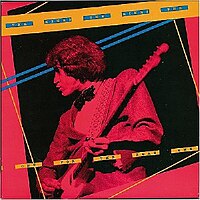
Glaring omissions, the pit fall of the list-maker. On my recent post about great live albums not only did I leave off 'Get Yer Ya Ya's Out', which Fred schooled me on, I also forgot this fantastic record by the Kinks from 1980.
Recorded during the American leg of their tour in support of the stellar 'Low Budget' LP, 'One For the Road' is jam packed with Kinks classics, many of which benefit from the heavier approach the band was working at the time.
Indeed, Dave Davies blasts his way throughout the four sides of this monster. At some point around this time Dave was asked in an interview if he was being influenced by the Heavy Metal bands of the day.
"It wasn't called Heavy Metal when I invented it."
Opening with an instrumental version of 'You Really Got Me', the band sets the mark for what will follow, blast after blast of high energy Rock occasionally peppered with more introspective numbers like 'Celluloid Heroes', and 'Misfits'.
Kinks staples include 'Til the End of the Day', 'Stop Your Sobbing', 'Where Have All the Good Times Gone', 'All Day and All of the Night', 'Victoria', and a rousing encore version of 'You Really Got Me' with vocals.
Much of the record is spent on the current LP release, 'Low Budget', including the title track, 'Catch Me Now I'm Falling', 'Attitude', 'Pressure', 'National Health', and '(Wish I Could Fly Like) Superman', and with good reason. That shit rocks.
The highlight is, of course, 'Lola'. A blistering rocked up take on the Kinks classic, the live 'Lola' was released as the single for the record, and it features the antagonistic charm and wit of bandleader Ray Davies. At the top of the track we hear Ray strum the instantly recognizable opening chord sequence and the audience naturally goes berserk at which point Ray stops. He then quips:
"Hey, I wasn't that good." And then after a pregnant pause:
"Because, uh, we're not going to play that one tonight."
Now the crowd fairly erupts, and Ray seemingly reluctantly gives in.
"Okay, but you've got to join in and sing along, I take a lot of persuading."
And then the band launches into the tune. That's called stagecraft, and Ray has it in spades.
In descending order:
3) The new season of Flight of the Conchords
2) Football
1) A different President
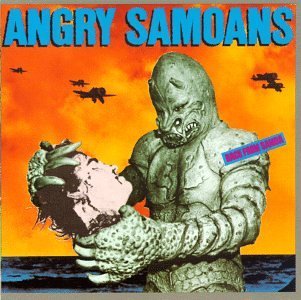

Monday, July 14, 2008

Recent activity on Mathdude's blog brought up the topic of Frank Zappa's 'Zoot Allures' LP. 'Zoot Allures' was one of the first Frank records that I heard. My brother Rod had it, as well as a number of others, and in my teenage years I developed an affinity for Frank based on that exposure. I'm sure what drew me to Zappa was his potty mouth, but it was the guitar tones on 'Zoot Allures', specifically on 'Wonderful Wino', that cemented the deal.
I remember I had a cassette tape of 'Zoot Allures' and some miscellaneous other Zappa tracks that I played a lot in 1980/81. I think one particular instance wherein I was playing that tape on my little boom box on the school bus was the point at which Tony Alva decided that maybe I wasn't an annoying little idiot.
I know for certain that in the summer of 1981, when Milkyum and I were councilors at West Point Youth Camp, I had brought along some Zappa, and before long my ten year-olds were walking around camp singing 'Bobby Brown Goes Down', a tale of accidental transgender and sado-masochism.
"Women's liberation came creeping all across the nation
I tell you people I was not ready, when I fucked this dyke by the name of Freddie
She made a little speech then, she tried to make me say when
She had my balls in a vice, but she left the dick
I guess its still hooked on, but now it shoots too quick"
I was told not to apply again the next year.
Personally I think Frank was a genius, and I find his music endlessly entertaining, but I've encountered a lot of opposition to Zappa over the years. People either love him, hate him, or have not been exposed to his work. Most of my attempts at turning folks on to Frank have not been very successful. Maybe that's because I'd always be hushing them so they didn't miss the next really funny lyric. That's very annoying, I know, but with Frank it's just so hard not to do.
Of those acquaintances who do like Zappa, many of them are stoic Mother of Invention fans, the first phase starting in the late 60's that featured a set line-up of musicians, the Mothers of Invention, and a decidedly vaudevillian approach centered around the live show, and a fair amount of improv within the context of Frank's compositions. I dig the Mothers, but I'm more fond of the post Mothers 70's stuff.
Jackson's Best of Zappa List:
1) Zoot Allures (1976)
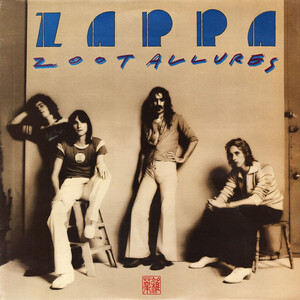
The whole album is great. 'The Torture Never Stops', 'Ms. Pinky', 'Wonderful Wino', 'Disco Boy', and 'Wind Up Working In a Gas Station' find Frank in top form and display a wide range of musical styles. The instrumentals: 'Black Napkins', 'Friendly Little Finger', and 'Zoot Allures' showcase his simply amazing guitar skills.
Many years after my introduction to this fantastic record I read in an interview with Frank that he cobbled the LP together from various out-takes and leftovers from previous records over the course of two days in order to supply Warner Bros with the final record of his contract with them.
I think that explains why I like the record so much, it's vary basic, mostly guitars, bass, and drums, and lacking in the xylophone and other extraneous instrumentation common to the Zappa canon.
2) Sheik Yerbouti (1979)
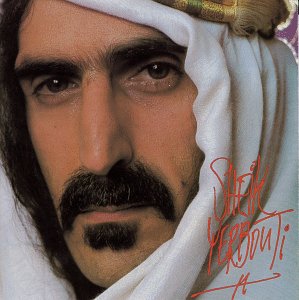
A double album, 'Sheik Yerbouti' is a lot to digest, and it can be overwhelming. Admittedly, I rarely ever listen to the whole thing in one sitting. The first side, however, is absolutely astounding. Beginning with Frank's severe mockage of Peter Frampton's turd of a follow-up to 'Frampton Comes Alive', 'I'm In You', 'I Have Been In You' establishes itself as a nicely crafted R&B number, and after suckering us in, he slowly pulls the curtain aside until you realize that he's very plainly discussing sexual penetration.
"I have been in you, baby, you have been in me
Aw little girl, there ain't no time to wash yer stinky hand
Go head and roll over, I'm going in you again"
Then he hits us with 'Flakes', with a special guest appearance by Bob Dylan (not really Bob), as he discusses his dissatisfaction with the job performance of various 'skilled laborers'. 'Flakes' also features a superb performance by guitarist Adrian Belew.
'Broken Hearts Are For Assholes' follows, and next to 'Bobby Brown' was a major factor in my not getting asked back to West Point Youth Camp'. The 'ram it up your poop shoot' bit is very catchy, and irresistible to ten year-olds.
The album also features the aforementioned 'Bobby Brown', the potentially very offensive 'Jewish Princess', and the single (single?) 'Baby Snakes' amid crazy instrumentals and other wacky Zappa compositions culminating in the sublime 'Yo Mama', which exhibits some mind-blowing Zappa lead guitar work.
3) Apostrophe (1974)

The Zappa record most often given spin time by my brother, 'Apostrophe' was most likely my first taste. Certainly 'Don't Eat the Yellow Snow/Nanook Rubs It' was an early favorite of mine. 'Apostrophe' finds Frank waxing allegorical, and much of the record takes the form of morality tales, twisted morality tales. 'Yellow Snow' pits a fur trapper against an Eskimo in a scatological battle over the fate of Nanook's (the Eskimo) favorite baby seal. 'St. Alfonso's Pancake Breakfast' details the delinquent behavior of a young parishioner gone amok of a Sunday morning. 'Cosmic Debris' finds the narrator forced to teach a lesson to a shady snake oil type street vendor, and 'Stinkfoot' provides a valuable lesson to those of us "who might wear tennis shoes or an occasional python boot".
It's 'Uncle Remus', however, that provides Frank's most stinging social criticism, and it might be the best example of what might be described as his better nature. A formidable Gospel evoking piano drives the track as Frank tackles racism, in particular Anglo Saxon prejudices toward African Americans. Initially, Frank takes the dangerous tack of what at first seems to be serious mockage of African Americans with his mention of afros and doo-rags, but we see, as the song concludes who's actually being mocked.
"I'll take a drive to Beverly Hills, just before dawn
An' knock the little jockeys off the rich people's lawns
An' before they get up, I'll be gone, I'll be gone
Before they get up I'll be knocking the jockeys off the lawn"
4) The Man From Utopia (1983)
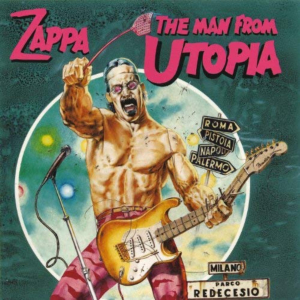
This mostly overlooked LP has been a favorite of mine since I bought it when it came out. Zappa's then protege Steve Vai is prominently featured on the record, as Frank's interest in playing guitar waned in the eighties.
'The Dangerous Kitchen', 'The Radio Is Broken', and 'Jazz Discharge Party Hats' are the highlights, but the whole record is strong, and is probably the last truly great Zappa effort as far as his work within the Rock idiom goes..
5) Over-Nite Sensation (1973)
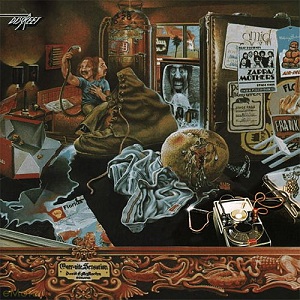
Sex is the main issue here, 'Camarillo Brillo', 'Dinah-Moe Hum', and 'Dirty Love' explore Frank's favorite topic. 'Montana' finds the narrator musing on the prospect of moving to Montana to raise a crop of dental floss.
6) Joe's Garage, Act 1 (1979)

The title track is one of the best things Frank ever did. Anyone who ever put together a band can relate.
"It wasn't very large
There was just enough room to cram the drums in the corner over by the dodge
It was a fifty-four with a mashed up door
And a cheesy little amp, with a sign on the front said Fender Champ
And a second hand guitar
It was a Stratocaster with a whammy bar"
'Catholic Girls' provides balance against 'Jewish Princess', and 'Crew Slut' and 'Why Does It Hurt When I Pee' deliver the crude sex based humor that is so prevalent in Zappa's music.
7) You Are What You Is (1981)

Another double album, and again, it's a bit overwhelming, but Side Three is very rewarding culminating with the exceptional 'The Meek Shall Inherit Nothing'.
"You say your life's a bum deal, and your up against the wall...
Well, people, you ain't even got no deal at all
'Cause what they do in Washington
They just takes care of NUMBER ONE
And NUMBER ONE ain't YOU
You ain't even NUMBER TWO"
There's much, much more Zappa, I've just scratched the surface, but these are my faves. Many of you don't care, and others will have a different list, and that's just dandy.

